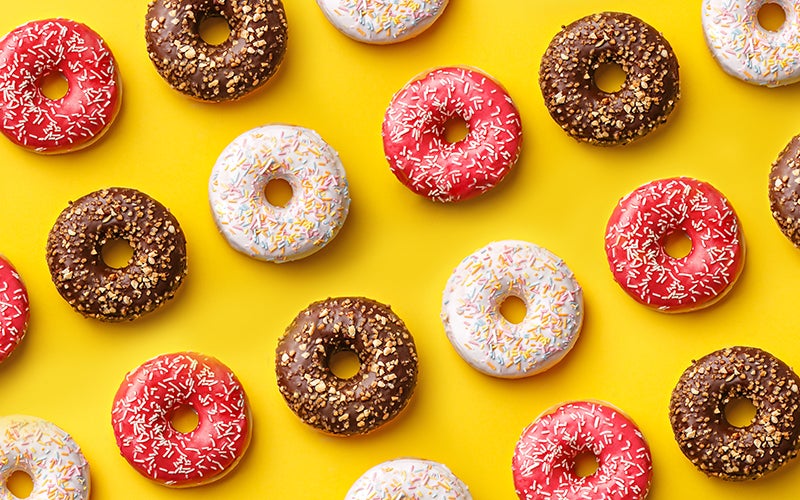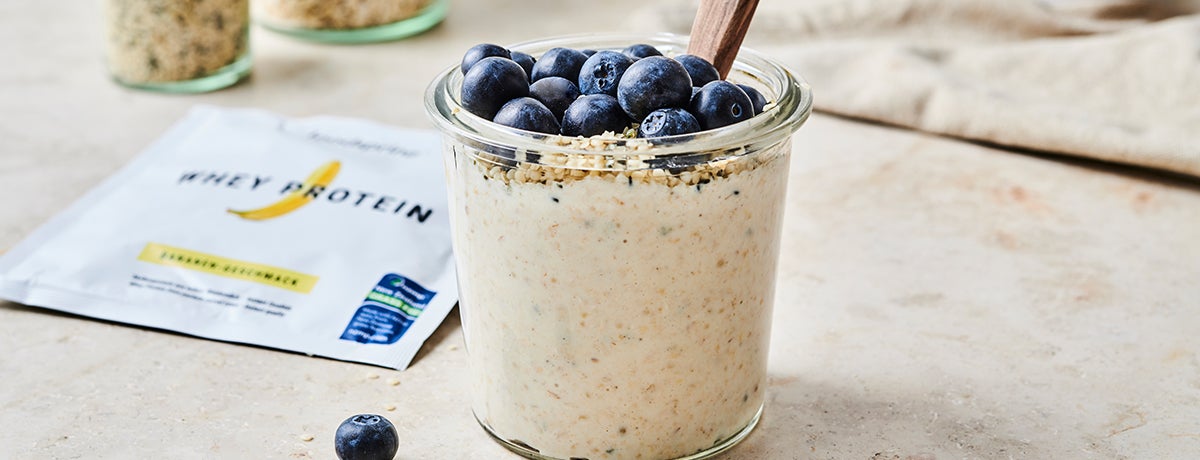Insulin: All about this vital blood sugar hormone
 ©foodspring
©foodspring
Insulin’s job is to tell the body’s cells to absorb glucose, which makes it the only hormone that lowers blood sugar levels. Keep reading for more on how it works and how you can maintain healthy insulin levels.
What Is Insulin?
Insulin is a hormone made up of two peptide chains: an A-chain of 21 and a B-chain of 30 amino acids, the building blocks of proteins. This means that, in structural terms, insulin is classified as a peptide hormone.
Insulin is produced in the beta cells of the islets of Langerhans in your pancreas. It’s then released into your bloodstream whenever your blood sugar level rises after eating, especially after a carbohydrate-rich meal.
Wondering why insulin is so important for a healthy metabolism? It’s the only hormone that brings your blood glucose levels back down again! Together with its counterpart, the hormone glucagon, insulin regulates your cells’ uptake of glucose.
Disruptions in its production or release can lead to illness.
Insulin’s Effect on Blood Sugar Levels
Whether it’s a relaxed cardio session, a strenuous workout with weights, or intensive stretching sets, the energy provided by your diet serves as the basis for all your physical activities. Without a balanced supply of carbs, fat, and protein, your level of performance in everyday exercise drops by up to 50%.

A sophisticated system lies behind the process of turning food to energy. Mostly this process focuses on carbs – potatoes, pasta, bread, etc. – that are turned into glucose chains as they’re transported from your mouth to your intestines via your esophagus and stomach. Once they arrive there, digestive enzymes break down these complex sugars into simple sugars. These sugars then enter the bloodstream through the intestinal wall and raise your glucose level.
In response to the rising sugar levels, the pancreas releases insulin to serve as a messenger substance. By binding to special insulin receptors, insulin circulating in your bloodstream sends information to the appropriate cells in your liver, muscles, and kidneys.
Then these cells absorb the simple sugars and either convert them immediately into energy or store them in the form of glycogen. This is why insulin has a blood glucose-lowering effect, because it enables glucose to leave the bloodstream and pass through the cell membrane into the cell interior. As the counterpart to insulin, the hormone glucagon regulates carbohydrate metabolism by stimulating the formation of glucose from stored glycogen, which then increases blood sugar levels.
Even if insulin is primarily released as a result of an increased blood glucose level, it also reacts when proteins and fats are consumed. On the one hand, insulin affects the absorption of amino acids into the cells and the formation of new proteins in the body, and on the other it regulates the absorption and storage of fat in the fatty tissues. High insulin levels lead to an increased storage of fat.
Influence of Diet on Insulin Release
Research has shown that eating habits, especially with regard to carb intake, influence insulin release. But not all carbs have the same effect. Depending on the type of carb involved, your blood sugar level – and therefore the release of insulin – can rise faster or slower.

©Vesna Jovanovic / EyeEmIf you devour a sweet milk chocolate bar, your blood sugar level rises because of the high content of simple sugar, which leads to insulin being released in large quantities. Most of us are familiar with this “sugar rush” – simple sugars are metabolized quickly, your energy level rises and then drops again.
After a meal with complex carbohydrates, however, your blood sugar level increases more slowly, as these long-chain carbs have to be broken down into simple sugars first. The secretion and effect of insulin is also slower as it adapts to the slow rise of the glucose level in your bloodstream.
Breaks between meals, i.e. hours when we don’t eat anything, ensure that sugar levels drop back down to their fasting level. In a healthy person, this is about 70 mg/dl. If you keep reaching for snacks over the course the day, your blood sugar levels will always be high – and insulin released. Excess glucose that your body doesn’t need to immediately produce energy, is stored in the liver and muscles in the form of glycogen.
Looking for healthy recipes with complex carbs for your body to break down slowly before they enter your bloodstream? Check out these tasty meals!
Overnight Oats

©foodspring
Zucchini Noodles With Lentil Bolognese

Couscous Salad

Check out this easy and tasty salad
By the way: Small amounts of insulin are released even when you’re not eating. The hormone released while you’re fasting or sleeping is called basal insulin.
What Is Insulin Resistance?
Insulin resistance means that the insulin sensitivity of your cells is impaired. The effect of the messenger substance is reduced so the affected cells don’t absorb the sugar from a carbohydrate-rich meal. When this happens, even though your blood sugar level rises and insulin is secreted by your pancreas, the liver, muscles, and kidneys cannot absorb the glucose to convert it into energy. The result: a permanently elevated blood sugar level.
This reduced insulin effectiveness is considered to be the most common disorder of carbohydrate metabolism. Overnutrition, a lack of exercise, and stress are thought to be the main causes, but age and genetics can also have a significant influence on carbohydrate metabolism. If left untreated, it can develop into type 2 diabetes.
The Connection Between Insulin and Diabetes
There are two types of diabetes mellitus: people with type 1 diabetes lack insulin, while patients with type 2 diabetes mostly suffer from the lack of insulin sensitivity described above.

The cells of a person with type 2 diabetes don’t respond as effectively to insulin, which initially leads to an increased secretion of insulin in order to compensate for the weak effect of the insulin, as the sugar would otherwise just accumulate in the bloodstream. We now know that cell sensitivity decreases with increasing body weight.
Dysfunctional insulin secretion and reduced insulin production compound the initial resistance in the long run. This is generally considered to be caused by the exhaustion of the pancreas.
This insulin resistance, the resulting disruption of glucose metabolism, high blood pressure, obesity, and a lipid metabolism disorder make up a cluster of conditions known as metabolic syndrome. Metabolic syndrome increases your risk not only of diabetes, but also of heart disease and stroke.
Unlike type 2 diabetes, type 1 diabetes is an autoimmune disease. In this type, the lack of insulin is caused by antibodies formed in the pancreas that destroy the insulin-producing beta cells. People suffering from type 1 diabetes produce either too little insulin or none at all and must undergo treatment that almost always includes insulin therapy in the form of injections. Today treatment is more flexible than ever because both rapid acting and long acting insulin are widely available.
Conclusion
- The insulin hormone is the only chemical messenger in your body that helps lower the level of sugar in your blood.
- This peptide hormone is produced in the pancreas and released when the glucose level increases.
- Your diet can influence insulin release.
- If carbohydrate metabolism is disturbed because the cells don’t have enough insulin sensitivity, the receptors in those cells display a resistance to insulin.
- Overnutrition and being overweight, a lack of exercise, and stress are considered to be the main causes of this resistance and thereby of type 2 diabetes.
- Type 1 diabetes is an autoimmune disease in which the pancreas doesn’t produce enough insulin.
Editors’ tip:
Start your free body check now for individually tailored nutrition and training recommendations from our experts.
Click here for your Body Check
Sources for this article
We at foodspring use only high-quality sources, including peer-reviewed studies, to support the facts within our articles. Read our editorial policy to learn more about how we fact-check and keep our content accurate, reliable, and trustworthy.






















